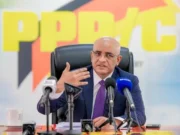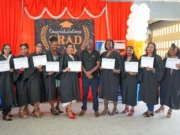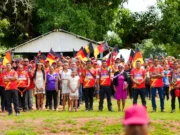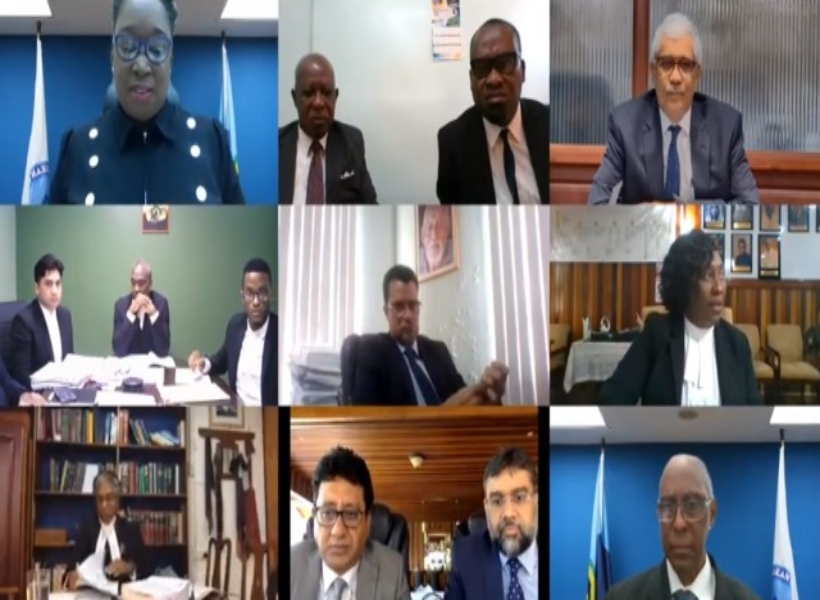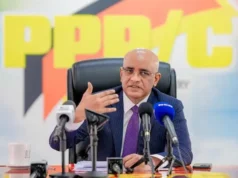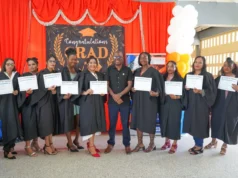By Feona Morrison
A battery of lawyers led by T&T Senior Counsel Douglas Mendes on behalf of PPP/C Presidential Candidate Irfaan Ali, and the party’s General Secretary Bharrat Jagdeo, this morning presented arguments before the Caribbean Court of Justice (CCJ), as to why the regional court has jurisdiction to hear an appeal against a majority ruling of the Court of Appeal in relation to an interpretation of Article 177 (2) (b) of the Constitution of Guyana.
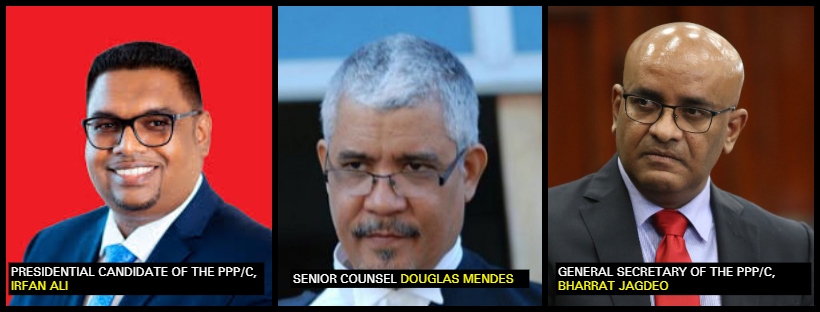
Further, the lawyers requested of the CCJ to make several Consequential Orders, one being for Chief Elections Officer (CEO), Keith Lowenfield to withdraw his report in which he invalidated some 115,000 votes.
Ali and Jagdeo are appealing the decision of the Court of Appeal delivered on Monday, June 22, 2020 in the case of government supporter, Eslyn David versus the Chairperson of the Guyana Elections Commission (GECOM), retired Judge Claudette Singh and Chief Elections Officer (CEO), Keith Lowenfield, and several representatives of small political parties that contested the March 02 General and Regional elections.
In the ruling, the Court of Appeal ordered that the words “more votes cast” in Article 177 (2) (b) of the Constitution of Guyana, be interpreted to mean “more valid votes cast” in terms of Order No. 60 of 2020 which governs the recount of all ballots cast in the March 02,2020 elections.
Article 177 of the Constitution speaks specifically to the Election of the President. Paragraph 2 reads: there is only one Presidential candidate at the election; or (b) states: there are two or more Presidential candidates, if more votes are cast in favour of the list in which a person is designated as Presidential candidate than in favour of any other list, that Presidential candidate shall be deemed to be elected as President and shall be so declared by chairman of the Elections Commission acting only in accordance with the advice of the Chief Elections; after such advice has been tendered to the Elections Commission at a duly summoned meeting.
Jagdeo and Ali claim that the decision of the Court of Appeal was wrong for many reasons, including that it did not have the jurisdiction to hear and determine the case. Ali and Jagdeo are contending that the Court of Appeal fell into grave constitutional error in its ruling, and was plainly wrong on several grounds; they have moved to the CCJ to have the decision overturned.
On the question of whether the CCJ has jurisdiction to hear the appeal, Senior Counsel Mendes responded in the affirmative to the five-member panel of judges led by the Court’s President Justice Adrian Saunders. He contended that notwithstanding the finality clause in Article 177 (4) of the Constitution, the narrow interpretation of the“ouster clause” does not apply in this case which has to be directed to another Court.
Article 177 (4) of the Constitution states: The Court of Appeal shall have exclusive jurisdiction to hear and determine any question as to the validity of an election of a President in so far as that question depends upon the qualification of any person for election or the interpretation of this Constitution; and any decision of that Court under this paragraph shall be final.
According to Senior Counsel Mendes, the CCJ has to determine whether the Court of Appeal decision was made under Article 177 (4) of the Constitution. He said that if the Court’s decision was indeed made pursuant to the provisions of this Article, then Section 4 (3) of the Caribbean Court of Justice Act, oust the CCJ from having jurisdiction to hear the case.
Section 4 (3) of the Caribbean Court of Justice Act reads: The Court shall have – ( a) original jurisdiction; (b) appellate jurisdiction provided for in this Act as is conferred on it in accordance with the provisions of Part III of the Agreement; (3) Nothing in this Act shall confer jurisdiction on the Court to hear matters in relation to any decision of the Court of Appeal which at the time of entry into force of this Act was declared to be final by any law.
He, therefore, submitted that the decision made by the Court of Appeal does not fall within the ambit of Article 177 (4) of the Constitution, and therefore the Court fell into error when it took jurisdiction over the matter. As a consequence, he asked that the decision of that Court cannot stand, and must be overturned by the CCJ. He told the bench of judges that the “CCJ must have jurisdiction to examine the jurisdiction of the Court of Appeal.”
Senior Counsel Mendes said that at the heart of the case is Article 177 (4) of the Constitution which contains the following elements; what question, the question must be as to the validity of the election of the president, and must depend upon the qualification of any persons for election and the interpretation of the Constitution.
According to the Senior Counsel, upon examining the Notice of Motion and Affidavit in Support by David, the reliefs being sought by her have a common team, that is, GECOM was supposed to determine a final credible count of the elections in accordance with Order No. 60 of 2020, governing the Recount of all ballots cast in the March 02, 2020 General and Regional election, but failed to do so. He noted that David is arguing that the only thing that went wrong was that GECOM failed to determine a final credible count.
Senior Counsel Mendes pointed out that there was no relief sought by David asking the Court of Appeal to invalidate an election. Instead, he pointed out, David is simply seeking to have certain questions determined. The Senior Counsel reasoned that in order to invoke the jurisdiction of the Court of Appeal, one ought to be raising the question as to the validity of an elections, which would either end in the process being declared valid or invalid.
First off, he explained that the persons whose election is being questioned must be before the Court. Interestingly, Senior Counsel Mendes pointed out that David, in her application to the Court, did not name anyone whose election might be in jeopardy- incumbent President David Granger or PPP/C Presidential Candidate Irfaan Ali.
It is against this backdrop, he insisted that the jurisdiction under Article 177 (4) of the Constitution can only be invoked after an election has occurred, and requested of the CCJ to reject David’s position that the provisions of that Article can be invoked at anytime, even before the election has concluded.
“…If you can move the court at anytime, then you can move to the court as to the qualification of a Presidential Candidate immediately after he/she is nominated and before their name is placed on the List of Candidate. The intention behind Article 177 (4) is to raise that question after the election has occurred. That did not happen in this case and the Court of Appeal ought not to have accepted jurisdiction to hear the case,” the Senior Counsel held.
He submitted that it is clear that the provisions of the above Article speak to questions as to the validity of an election, and depend on the qualification of a person and the interpretation of the Constitution. If the question raised does not depend on these, then the Court of Appeal does not have jurisdiction, the Senior Counsel put forward to the CCJ.
Senior Counsel Mendes explained that Article 163 of the Constitution vests exclusive jurisdiction in the High Court to determine the validity of an election to the National Assembly, and that the first thing that falls under this list is the validity of the votes cast for a List of Candidates. The procedure for determining this, he added, is set out in the Representation of the People Act (RoPA), and any Orders by GECOM.
So, the jurisdiction of the High Court would involve inquiring into any breaches to the RoPA and Orders by the Elections Commission, he stated. In light of the foregoing, the Senior Counsel submitted that both the High Court and Court of Appeal cannot have exclusive jurisdiction over the same things.
When one is to analyze David’s case, he said that the only thing the Court of Appeal was primarily asked to do was to determine if GECOM was required to determine the credibility of the votes and make an Order accordingly. He reminded that the credibility of the votes arose when APNU agent Joseph Harmon complained of certain irregularities regarding the Recount of all ballots to GECOM.
But Mendes, further reminded that GECOM made it clear that it does not have the powers to investigate these irregularities, which would include calling witnesses, et cetera, and that these matters have to be resolved in the elections Court pursuant to the provisions of Article 163 of the Constitution, which would involve the filing of an election petition after a final result is declared.
Questioned by the CCJ as to whether what arm of government GECOM falls under, Mendes said Executive, and held that for the electoral body to cloak itself with the authority of a Court of Law and probe the irregularities, would be a violation of the Separation of Powers Doctrine.
The hearing is presently ongoing virtually and can be viewed via the CCJ’s Youtube Channel.

